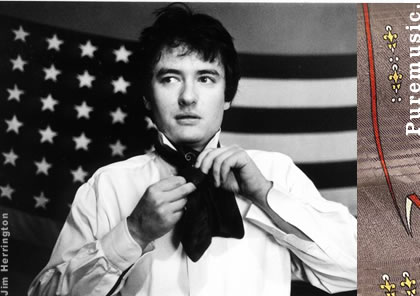
A Conversation with
Paul Burch
(continued)
PM: It's impossible to say enough about guitar geniuses like George Bradfute or Richard Bennett, but let's make a stab.
PB: Well, a stab. What I can say about George is he's got a sense of timing that's very inventive; if a note was a train, he kind of grabs onto the note when you just think that there's no time left to grab it. And I mean that in a measure of like one, two, three, four, he just--there's this little bit of hesitation, and once he becomes part of your music, your timing is really sort of altered.
PM: Wow.
PB: There are very few musicians who can do that. Richard's very different, but also a very inspired guitar player. He's also dealt with every problem that you could ever have as a guitar player or a producer or as a singer, and knows what to do.
And he's devoted to the instrument. There's a great deal of dignity in what he does. And so at the times when it's just what you need, or even in the times when you don't agree with it, there's so much that I learn from being with him, because he's constantly inspired. And like me, he's also constantly pissed off at how bad things can be when it doesn't have to be that bad.
PM: [laughs]
PB: He's both a really creative person and he's also somebody who has to work under conditions that he can only bend a little bit sometimes. So he's really, really interesting. I mean, there's nobody else I can go to and I can say, "I just heard this Mills Brothers record. What the hell are they doing behind that Mills Brothers arrangement?" And he can take out his guitar and say, "This is what the guitar player for the Mills Brothers did."
PM: Wow.
PB: And there's nobody who can show me that. And he's certainly a lead guitar player, but rhythm is--everything that that means, to really propel a band, he's really the guy.
What's interesting about George Bradfute is, he's somebody who has a very creative mind who goes a lot of different directions. I mean, he plays cello and fiddle and stuff, and he's a great slide guitar player. You'd swear you're listening to Duane Allman when you hear him play slide--
PM: And does he play steel?
PB: But he doesn't play steel guitar, not that he can't understand the technical aspects of it. One of the great things about George is that if you go to his studio, he's got a lot of cheap instruments. And if you pick them up and play them, you'll say, "George, this sounds fantastic." And then the minute you buy it from him and get out the front door, it never sounds as good again.
PM: [laughs]
PB: And there's nothing he does to do that, he's not trying to fool you. You're the one who picks up the guitar, and there's just something about things when they're in his universe, they sound better. And he's one of the only musicians who can come in without a rehearsal and make a difference in how the night sounds, whereas most people, including myself, need to be at least a little rehearsed.
PM: Right.
PB: You'll have a performance, or the other performance.
PM: [laughs]
I'm crazy about the tune "I'm Takin' It Home."
PB: Oh, thanks.
PM: Put us there, if you would, at that moment, where and how it was, and how it went down.
PB: Oh, you mean, recording it?
PM: Yeah.
PB: All in one room. Well, technically it was very simple. And it was an experiment, actually, after listening to WAMB, I kept hearing these records that sounded really, really good. And so we tried to make something, literally, really, in one room, at a very low volume. And I was actually sick as a dog that day. I'm not sure how we ended up singing it. But the nice thing about when you play like that, especially if you get musicians whose sound you already like, everyone kind of figures out that you can only get so loud before it falls apart.
PM: Right.
PB: So it's a little bit delicate, and it sounds like it was really rockin' and raucous, but it was at a very sort of good volume, when I tried to recreate the best moments of playing at the Family Wash, which is usually before everybody gets too loud and it just sounds like a bunch of noise--which to the musicians sounds really good, but the people out front are going, "Yeah, you should have stopped at about 8:30."
PM: [laughs]
PB: It was like I was saying "0kay, it's 8:15, and we're just about to get too loud, and the night is about to get obnoxious."
PM: "Let's play one more song."
PB: Right.
PM: So what room were you in, and who was in the circle?
PB: I was actually in a little studio that Joe McMahan has here in Nashville.
PM: What does he call that?
PB: Wow and Flutter. And it was Marty and Jim and Jennifer and George and myself, and I think Joe was playing guitar as well, and hitting the tape button. I mean, it's possible that he missed out on it, but I put his name on there because we did four or five in a row, really just kept doing it, and then I'd listen to them all back. And the one that I thought was the one was the one that we used, so I think he's on there as well. And I put all the amps on the floor and just kept the volume down, and it was really nice.
PM: Yeah, it sounds fantastic. continueprint (pdf) listen to clips puremusic home